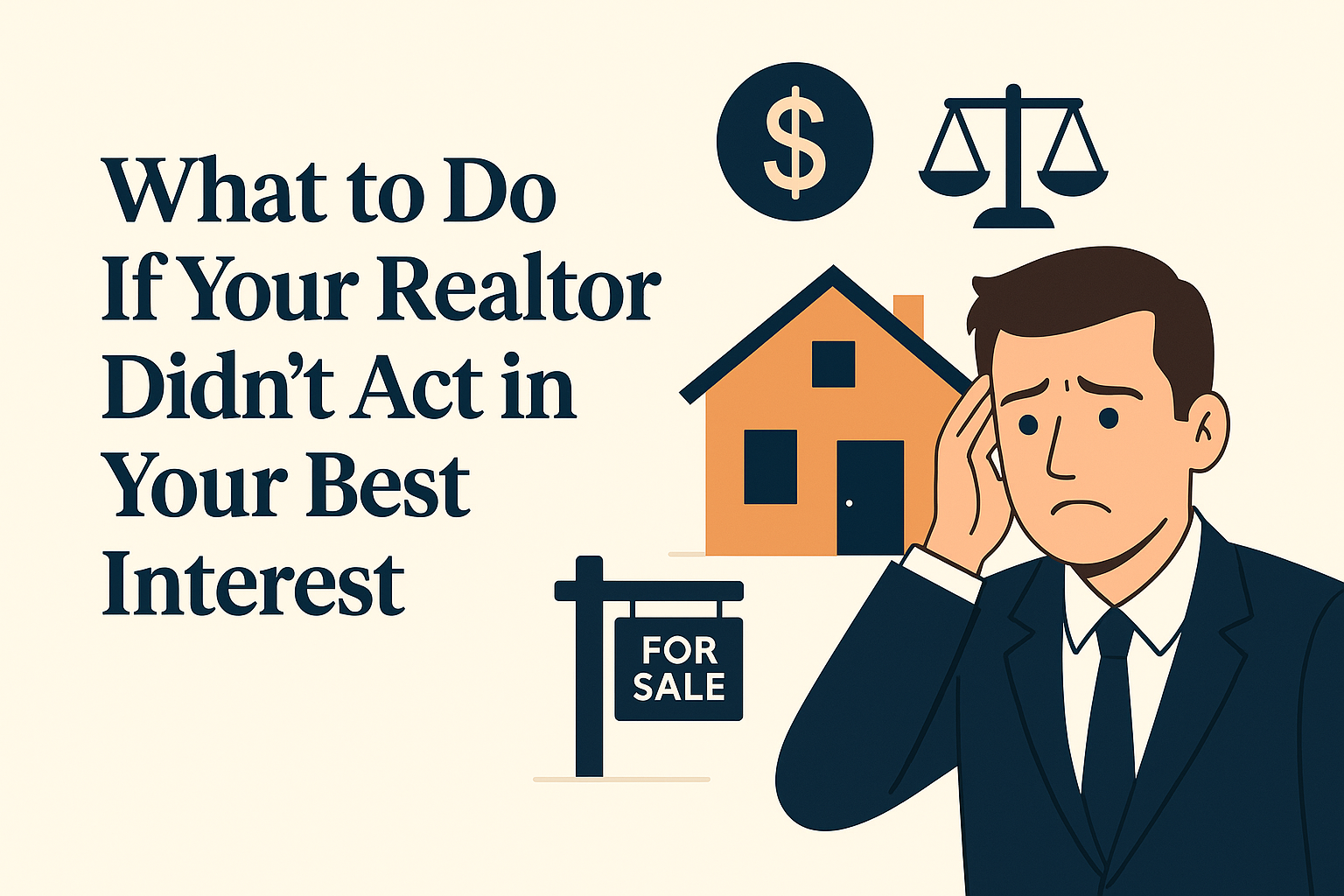Buying a home is one of the biggest financial decisions you’ll ever make, and you rely on your real estate agent (Realtor) to guide you honestly and loyally. Realtors are fiduciaries, meaning they owe you duties of loyalty, disclosure, and care – they must always put your interests above their ownch-tacoma.com. Discovering after the purchase that your agent failed to act in your best interest can be shocking and upsetting. This blog post will explain actionable steps you can take – including legal and financial advice – to address the situation and protect yourself moving forward.
1. Stay Calm and Document Everything
Start by gathering all evidence of what went wrong. Write down a clear timeline of events while details are fresh in your mind. Collect every relevant document that highlights how your Realtor may have failed youupnest.com. This can include:
- Emails, text messages, and communications with the agent.
- Your buyer’s agency agreement or any contract with the agent.
- The purchase contract and disclosure forms.
- Home inspection reports, appraisals, or repair estimates.
- Any other documentation (or witness information) that supports your claim.
For example, if you suspect your agent knew about a serious issue (such as termite damage) but didn’t disclose it, gather the purchase contract (which is supposed to list known issues), the inspection report, and any repair estimates that came to light after closingupnest.com. Comprehensive evidence will strengthen your case and be useful in any complaint or legal action.
2. Review Your Contracts and Rights
Take a close look at all the paperwork from your transaction. Review the agreement you signed with your agent and the property purchase agreement. These documents outline the agent’s duties and any disclosures. Check if the agent violated specific terms or any state real estate laws (for instance, failing to disclose known defects could violate both the contract and licensing law). Understanding the obligations on paper will clarify how the agent fell short.
It’s also wise to refresh yourself on your state’s homebuyer protections and the Realtor Code of Ethics. The National Association of REALTORS®’ Code of Ethics requires Realtors to be honest and put clients’ interests first. Knowing the exact rules or ethical standards your agent violated (such as the duty of full disclosure or loyalty) will help you articulate the issue clearly when you take further actionch-tacoma.com.
3. Communicate Your Concerns (Agent and Broker)
Before rushing into formal complaints, try to resolve the issue directly if possible. Contact your agent and clearly but calmly explain your concerns. There’s a chance the problem resulted from miscommunication or error rather than malice. Give the agent an opportunity to respond or make it right. Keep a record of these communications as well.
If the agent’s response is unsatisfactory or you’ve lost trust, escalate the matter to their supervising broker (every real estate agent works under a licensed broker). Explain the situation to the broker-in-charge of the firm. Brokers have a strong incentive to address client issues – they can be held accountable for an agent’s misconduct and will want to avoid legal trouble or reputation damagech-tacoma.com. In many cases, a broker might step in to mediate, correct the issue, or offer a solution (such as covering a repair or releasing you from a contract) to maintain their company’s reputation.
Tip: If you suspect truly unethical or illegal behavior, you may choose to skip directly to filing official complaints or seeking legal advice. But if the issue is moderate (poor communication, minor negligence), a frank discussion can sometimes resolve it without further escalationch-tacoma.com. Just be sure not to sign any release or agreement accepting a token solution if you still intend to pursue formal remedies – consult a lawyer first in that case.
4. Seek Legal Advice Early
When a serious breach of trust or legal violation is at play, it’s wise to consult a real estate attorney as early as possible. An experienced lawyer can evaluate your situation and explain your rights under state law. They will know exactly which fiduciary duties or regulations the agent may have violated and how to prove itupnest.com.
A lawyer can also guide you on the best course of action. For example, they might draft a strongly worded demand letter to the agent’s brokerage, which could lead to a quicker settlement. They can advise whether your grievances would be best handled through a regulatory complaint, mediation, or a lawsuit, given the specifics of your casech-tacoma.com.
Importantly, an attorney will help you understand potential outcomes and costs. Not every misstep by an agent justifies an expensive lawsuit. A lawyer may suggest simpler remedies if the financial stakes are small (or point you toward small claims court). On the other hand, if you suffered significant losses due to the agent’s actions (for instance, overpaying for a property because the agent withheld information), an attorney can prepare to seek compensation through the courtsquickenloans.com. The initial consultation is often worth it to clarify your options.
Remember: Many state laws and deadlines (statutes of limitations) apply to real estate disputes. Don’t delay in getting legal guidance. In some states you may have a few years to take action, but others have shorter windows – for example, Florida allows up to five years to file a real estate agent complaint, whereas Texas allows four yearsupnest.com. Acting promptly will preserve your full range of options.
5. File Official Complaints with Regulatory Bodies
If your Realtor truly failed in their duties, filing a formal complaint is a critical step. This holds the agent accountable to regulators and can prevent future buyers from being harmed. There are a few avenues for official complaints:
- State Real Estate Commission (Licensing Board): Each U.S. state has an agency that licenses and regulates real estate agents (often called the Real Estate Commission, Department of Real Estate, or similar). Contact your state’s real estate commission to report the agent’s misconductupnest.com. Typically, you will fill out a complaint form or submit a detailed written complaint to trigger an investigationupnest.com. Provide all the evidence you gathered. The commission will review your allegations and may interview parties or subpoena documents as they investigateupnest.com. If they find the agent violated state law or regulations, they can impose disciplinary actions – for example, fines, license suspension or revocation, or required trainingupnest.com. (Keep in mind, the commission’s role is to enforce license law and protect the public, not to recover your money – we’ll address compensation in the next section.) Be patient, as these investigations can take months to concludeupnest.com.
- Local REALTOR® Association (Ethics Complaint): If your agent is a REALTOR® (a member of the National Association of Realtors) you have an additional channel: filing an ethics complaint with the local Realtor Association. Realtors must abide by NAR’s Code of Ethics. You can allege specific Articles of the Code that were violated (such as Article 1, which covers promoting clients’ interests)nar.realtor. The local association will hold a hearing to evaluate the ethics complaint. They can discipline members for unethical conduct (from requiring education up to fines or suspension from the Association), though they do not have the power to revoke a state license. An ethics complaint is worthwhile especially if the issue is clearly unethical even if not illegal (for example, a conflict of interest or failure to disclose something important that wasn’t strictly required by law).
- Consumer Protection Agencies: If you suspect fraud, theft, or other criminal behavior by the agent (for instance, the agent stole funds or deliberately defrauded you), report it to government consumer protection authorities. This may include your state Attorney General’s office or the consumer protection division of your local District Attorneyoag.ca.gov. They can advise if the matter falls under criminal statutes like fraud. You can often file a consumer complaint with the Attorney General online as welloag.ca.gov. These agencies might not resolve individual contract disputes, but they do track patterns of fraud and can prosecute egregious cases, which may help you and others. Additionally, some states have a consumer recovery fund for victims of real estate fraud. For example, California’s real estate regulator administers a Consumer Recovery Account that can compensate consumers who were defrauded or had funds misused by a licensed agentoag.ca.gov. Ask your state real estate commission if a similar fund exists in your state, and how to apply for relief if so.
When filing any complaint, be truthful and specific. Stick to the facts (who, what, when, where, how) and attach copies of evidence. Regulators will not take sides; they will investigate objectively. Also, don’t fear retaliation – once a complaint is filed, agents are generally prohibited from harassing or trying to dissuade you (and such interference would get them in even deeper trouble). If your agent attempts to contact or intimidate you after you’ve filed, document it and inform the authorities handling your caseupnest.com.
6. Pursue Financial Remedies (Legal Action)
One common misconception is that filing a complaint will undo the deal or get your money back. In reality, **regulatory bodies can discipline an agent but cannot cancel a sale contract or award you damagesupnest.com. If you suffered a financial loss due to your Realtor’s actions – for example, you overpaid for the home, incurred repair costs that should have been covered, or missed out on a better deal – you’ll need to pursue separate avenues for compensation.
Here are steps to consider for financial recovery:
- Negotiate or Mediate: Sometimes, raising the specter of legal and regulatory action motivates the agent or their broker to offer a settlement. They might agree to pay for a needed repair, refund part of their commission, or otherwise compensate you to resolve the matter quietly. If they show willingness, you could engage in mediation – a neutral mediator can help both sides reach a fair compromisech-tacoma.com. Make sure any agreement is in writing. And do not release the agent from liability unless you are fully satisfied with the compensation, or unless advised by your attorney.
- Small Claims Court: If the amount of money at stake is within your state’s small claims limit (often ranging from a few thousand up to around $10,000 depending on the stateupnest.com), you can file a lawsuit in small claims court without needing to hire a lawyer. This process is generally faster and more user-friendly, though it’s limited in how much you can recover. An attorney or your local small claims clinic can advise if this is a viable route for your situationupnest.com.
- Civil Lawsuit for Breach of Fiduciary Duty or Negligence: For larger damages or complex cases, you may file a lawsuit in civil court. Typically, your claim would be that the agent’s breach of fiduciary duty, negligence, or misrepresentation caused you harm. Winning a lawsuit requires proving the agent’s wrongdoing and the losses it caused you, usually with the help of an attorneych-tacoma.comquickenloans.com. If you can prove your case, the court can award you monetary damages to cover your lossesquickenloans.com. In egregious cases involving fraud, courts might even award punitive damages or order the agent to pay your attorney fees, though this varies. Notably, a successful lawsuit (or sometimes even the complaint investigation) can lead to professional consequences for the agent – at minimum they might have to return their commission or, in serious cases, they could lose their real estate licensequickenloans.com.
- Insurance Claims: Real estate brokers often carry Errors & Omissions (E&O) insurance for mistakes. If the agent’s error is clear-cut (like failing to submit an offer or paperwork that lost you a deal), you or your attorney can notify their broker’s insurance carrier. In some cases the insurer may offer a settlement. This is a more nuanced approach and typically done with legal guidance.
Throughout any legal process, work closely with your attorney, follow their advice, and keep all communications documented. Lawsuits can be time-consuming, but sometimes filing is enough to prompt a settlement. Always weigh the cost and effort of litigation against the potential recovery. Your lawyer’s job is to serve your best interests, so they should help you decide on a strategy that makes financial sensech-tacoma.com.
7. Protect Yourself Going Forward
After going through such an experience, it’s natural to feel cautious about future real estate transactions. Learn from this situation to protect yourself next time. Here are some strategies to ensure you have a trusted advocate in your corner when buying or selling a home again:
- Choose Your Agent Wisely: Do thorough research before hiring a real estate agent. Seek recommendations from friends or family who had good experiences. Look up online reviews, but more importantly, verify the agent’s license status and check for any disciplinary record with your state’s real estate commissionoag.ca.gov. (Most state regulatory websites let you search an agent’s name to see if they’re actively licensed and if they’ve been sanctioned before.) Knowing an agent has a clean record and solid experience can provide peace of mind.
- Interview Agents and Ask Questions: Don’t be afraid to interview multiple agents. Ask about their experience, how they handle conflicts of interest, and request references from past clients. A true professional will appreciate that you’re doing your homework. Trust your instincts – if something feels off or if an agent is dismissive of your questions, keep looking.
- Understand Agency and Loyalty: Make sure you have a clear, written agreement that the agent represents you as the buyer (or seller, if that’s the case) exclusively, and owes you full loyalty. Avoid or carefully consider dual agency situations where one agent or brokerage represents both sides – these can compromise an agent’s ability to fully advocate for you. Always insist on timely disclosure of any potential conflicts (for example, if your agent has a business relationship with the seller, that must be disclosed).
- Stay Informed During the Process: Even with a great agent, stay engaged in your transaction. Read documents thoroughly (and early), attend the home inspection, and ask questions about anything you don’t understand. If your agent gives an explanation that doesn’t sound right, don’t hesitate to seek a second opinion – whether from another real estate professional, an attorney, or resources like your state’s consumer protection guides. (Many state agencies publish homebuyer guides or “how to choose a real estate agent” bookletsoag.ca.gov. Taking advantage of these resources can make you a more empowered consumer.)
- Trust but Verify: It’s okay to trust your agent’s expertise, but also verify critical information. For example, if the agent says a problem was fixed or a permit was finalized, ask for documentation. If the agent recommends a certain service (like a particular home inspector or lender), you can use them but also research alternatives for comparison. By staying proactive and informed, you reduce the chance of being misled.
- Keep Records: Retain copies of all key emails, texts, and documents in every real estate deal. Not only will this help if any dispute arises, it also lets you easily reference past information. Good record-keeping is one of the best defenses if someone’s story changes later on.
Finally, remember that most real estate agents are honest, hardworking professionals who truly want the best for their clients. Don’t let one bad experience sour you on all Realtorsupnest.com. By taking the steps above, you can hold a bad actor accountable and move forward with confidence. The lessons you’ve learned will help ensure your next home purchase is handled with the care and integrity you deserve.
References:
- National Association of Realtors – Code of Ethics & Filing Complaintsnar.realtor
- UpNest – How to File a Complaint Against a Real Estate Agentupnest.comupnest.com
- Curiale Hostnik PLLC – Breach of Fiduciary Duty by a Real Estate Agentch-tacoma.comch-tacoma.comch-tacoma.com
- Quicken Loans (Rocket Mortgage) – Understanding Fiduciary Duty in Real Estatequickenloans.com
- California Dept. of Real Estate / Attorney General – Consumer Guide: Real Estate Agentsoag.ca.govoag.ca.gov
- South Carolina Real Estate Commission – Complaint Process Overviewwistv.com (example of state procedure)
- And various state resources on verifying licenses and consumer recovery fundsoag.ca.govoag.ca.gov.




